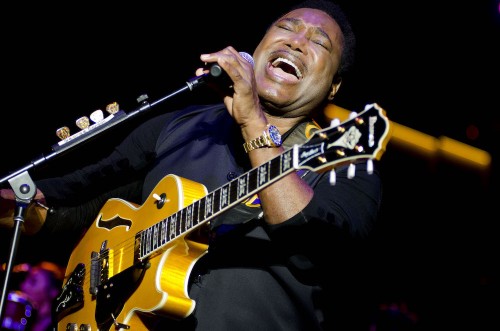Jan 13, 2026 2:09 PM
More Trump-Kennedy Center Cancellations
The fallout from the renaming of the John F. Kennedy Center for the Performing Arts to include President Donald…

George Benson, shown here at the 2016 Detroit Jazz Festival, performs songs written by Fats Domino and Chuck Berry on his new album.
(Photo: C. Andrew Hovan)For his new album, George Benson turned to the past. On Walking To New Orleans (Provogue), the jazz guitarist/singer pays tribute to two rock ’n’ roll icons: Fats Domino and Chuck Berry, both of whom died in 2017. Featuring Domino classics like 1956’s “Blue Monday” and Berry’s 1959 hit “Memphis, Tennessee,” Benson’s 45th outing as a leader might be his first unabashedly rocking album. It also represents his coming full circle—back to his rock ’n’ roll roots as a precociously gifted kid growing up in Pittsburgh.
“I had a band called George Benson & His All-Stars, and we played rock ’n’ roll,” he recalled over the phone from his home in the Phoenix area. “We played whatever was on the jukebox, and both of those guys were on the jukebox all the time. So, making this record was relatively easy, because I remembered so many of those tunes. But I also knew better than to try and copy those icons. There’s only one Chuck Berry and only one Fats Domino. Both guys had their own distinctive character, their own vibe, their own sound.”
Recorded at Ocean Way Studios in Nashville with a group of first-call session players, Walking doesn’t have the typical elements Benson fans might expect, such as long segments of fiery fretwork with precisely picked 32nd notes. “We tried to keep it simple,” he explained. “It’s like each song is telling me what I should be playing. My job was to sing the song and not get in the way, because this whole project was about storytelling. All I can do is try to create a mat for those stories to rest on, and that requires a simpler approach to playing.”
Benson does, however, get in some of his signature solo licks on two tracks—Berry’s 1964 single “Nadine (Is It You?)” and Domino’s hit “Ain’t That A Shame,” which topped the r&b charts in 1955. “The bassist on the session, [Alison Prestwood], told me, ‘I was waiting for you to do that. Now, I hear George Benson!’ But I was trying to stay away from that because we didn’t want to get the attention away from what we were trying to accomplish, which was to bring back the beauty of the ’50s ... . And I didn’t want the audience to lose that vibe. They’ve heard me play; they know what I can do. But to stay somewhere in the ballpark of the originals would be a major coup.”
On his previous recording, 2013’s Inspiration: A Tribute To Nat King Cole, Benson saluted an artist who began his career as a jazz pianist before earning widespread popularity as a vocalist. Cole was an obvious role model for Benson, who gained notoriety as a hotshot young sideman in “Brother” Jack McDuff’s organ group before debuting as a leader, at age 21 on Prestige, with 1964’s strictly instrumental The New Boss Guitar Of George Benson. Columbia producer John Hammond then signed Benson to a deal with the label under the condition that he sing at least two songs per album. “It was part of my deal,” Benson recalled. “CBS Records told John Hammond, ‘We don’t need another guitar player.’ So when he told them I also sing, they said, ‘If he’s a singer, we’ll sign him.’ That’s how that came about.”
On the heels of his Columbia signing, the guitar great delivered soulful vocal renditions of “Summertime” and “A Foggy Day” on 1966’s It’s Uptown and “All Of Me” on 1967’s The George Benson Cookbook. His singing was prominently featured on his 1970 Beatles tribute, The Other Side Of Abbey Road (A&M), and on his 1976 smash, Breezin’ (Warner Bros.), which earned him three Grammy awards, including a Record of the Year honor for his rendition of Leon Russell’s “This Masquerade.”
And Benson still is in particularly good voice on Walking. “We did the whole session with just the band live in the studio, and the atmosphere was genuine,” he said. “When you hear them play, it’s part of their lifestyle, it’s who they are. They made me feel so comfortable, man, like this is what we should be doing. So, I’m going to have a lot of fun with this record when I go on tour.” DB

Belá Fleck during an interview with Fredrika Whitfield on CNN.
Jan 13, 2026 2:09 PM
The fallout from the renaming of the John F. Kennedy Center for the Performing Arts to include President Donald…

Peplowski first came to prominence in legacy swing bands, including the final iteration of the Benny Goodman Orchestra, before beginning a solo career in the late 1980s.
Feb 3, 2026 12:10 AM
Ken Peplowski, a clarinetist and tenor saxophonist who straddled the worlds of traditional and modern jazz, died Feb. 2…

The success of Oregon’s first album, 1971’s Music Of Another Present Era, allowed Towner to establish a solo career.
Jan 19, 2026 5:02 PM
Ralph Towner, a guitarist and composer who blended multiple genres, including jazz — and throughout them all remained…

Rico’s Anti-Microbial Instrument Swab
Jan 19, 2026 2:48 PM
With this year’s NAMM Show right around the corner, we can look forward to plenty of new and innovative instruments…

Richie Beirach was particularly renowned for his approach to chromatic harmony, which he used to improvise reharmonizations of originals and standards.
Jan 27, 2026 11:19 AM
Richie Beirach, a pianist and composer who channeled a knowledge of modern classical music into his jazz practice,…